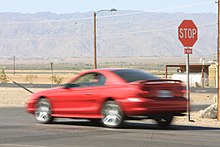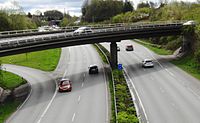| This article needs additional citations for verification. Please help improve this article by adding citations to reliable sources. Unsourced material may be challenged and removed. Find sources: "Moving violation" – news · newspapers · books · scholar · JSTOR (November 2013) (Learn how and when to remove this message) |

A moving violation or traffic violation is any violation of the law committed by the driver of a vehicle while it is in motion. The term "moving" distinguishes it from other motor vehicle violations, such as paperwork violations (which include violations involving vehicle insurance, registration, and inspection), parking violations, or equipment violations. The United States Department of State makes reference to moving violations in its enforcement guidance.
Types
 A car carrying an excessive amount of cargo, secured to the trunk using duct tape. Such a violation would be considered relatively minor.
A car carrying an excessive amount of cargo, secured to the trunk using duct tape. Such a violation would be considered relatively minor. A car traveling on opposite lanes, facing opposing traffic. Such a violation would be considered major.
A car traveling on opposite lanes, facing opposing traffic. Such a violation would be considered major.
While some violations, like parking violations, are civil matters involving a vehicle's owner, moving violations are charged against the actual driver.
Moving violations are usually classified as infractions or misdemeanors, but serious violations such as hit and run, driving under the influence, and road rage can be considered felonies.
Costs
Moving violation convictions typically result in fines and demerit points assessed to the license of the driver. As a driver accumulates points, they may be required to attend defensive driving lessons, re-take their driving test, pay additional taxes, or even surrender their license. Additionally, moving violations often increase insurance premiums. Drivers with more points on their driving record often must pay more for car insurance than drivers with fewer.
Sometimes tickets are used in a speed trap as a form of fundraising. For example, a local government that is suffering a budget shortfall may ticket more aggressively within its jurisdiction to increase revenue.
In the United States, citation fines can vary widely between jurisdictions for the same behavior, usually between $25 and $1,000. In countries such as Finland however, they are specific proportions of the violator's income, and fines in excess of $100,000 can be assessed to wealthy individuals. In Canada, each province is individual in how they treat similar behavior and each violation usually includes a set fine and demerit points against the driver's license. For example, a speeding ticket in Ontario of 50+ km over is 6 demerit points against the driver's license with the approximate fine calculated as (km over x 9.75) x 1.25, as well it carries a one-week automatic license suspension and car impoundment. In Manitoba speeding in excess of 49 km is 10 demerit points and a fine of 672 dollars and a Serious Offence Licence Suspension.
Examples of moving violations

- Speeding, which can be exceeding a limit or (in some jurisdictions) simply driving at an unsafe speed
- Driving significantly below the speed limit to the point of obstructing traffic
- Tailgating or failing to maintain an assured clear distance ahead
- Driving or rolling past a stop sign or red traffic light without stopping
- Failure to yield to another vehicle with the right-of-way
- Failure to signal for turns or lane changes
- Improper lane usage, such as failing to drive within a single lane
- Crossing over a center divider, median, or gore
- Driving on the shoulder where it is considered illegal under certain conditions
- Failure to use a seat belt
- Illegal use of window tints and obstructions
- Failure to stop for a pedestrian in a crosswalk
- Failure to stop for a school bus when children are boarding or exiting (in certain jurisdictions)
- Failure to secure a load to a truck, lorry, or other vehicle
- Driving in a car pool lane illegally
- Operating a telecommunications device while driving (in jurisdictions that prohibit this)
- Driving a vehicle outside the conditions of one's license
- Driving without a license or with a suspended license or with a license from another country
- Driving a vehicle in a bus lane or on railway tracks
- failure to stop after a traffic collision or make a report
- Driving on the wrong side of the road, unless there is an obstruction
More serious moving violations include:
Moving violations and driving records

Exactly how long moving violations stay on a driving record depends on jurisdictional laws; for example, in New York, minor moving violations can stay on a driving record abstract for a maximum of four years. Whereas minor moving violations tend to stay on a person's abstract for only a few years, some serious moving violations are classified as criminal offenses that result in a criminal record that may be maintained for life.
See also
References
- Conlon, Joe (Winter 2015). "A Missouri Citizen's Guide to Red Light Camera". Missouri Law Review. 80 (1): 5.
- "OFM Enforcement of Moving Violations". United States Department of State. Office of Foreign Missions. Retrieved 2023-01-30.
- Palumbo, Aimee; Pfeiffer, Melissa; Metzger, Kristina; Curry, Allison (December 2019). "Driver licensing, motor-vehicle crashes, and moving violations among older adults". Journal of Safety Research. 71: 87–93. doi:10.1016/j.jsr.2019.09.019. PMC 8928098. PMID 31862048. S2CID 209433677.
- "Dallas' sheriff hopes patrol merger is the ticket to more revenue | News for Dallas, Texas | Dallas Morning News | Breaking News for Dallas-Fort Worth | Dallas Morning News". Archived from the original on 2009-03-25.
- "Sheriff cuts jail freebies like pickles and ketchup | News for Dallas, Texas | Dallas Morning News | Breaking News for Dallas-Fort Worth | Dallas Morning News". Archived from the original on 2009-03-27.
- www.2theadvocate.com https://web.archive.org/web/20080918091107/http://www.2theadvocate.com/news/26942504.html. Archived from the original on September 18, 2008.
{{cite web}}: Missing or empty|title=(help) - McNight, A. James (1988). "Special Report 218: Transportation in an Aging Society" (PDF). Transportation Research Board. National Research Council. p. 114. Retrieved 1 October 2021.
| Traffic law and safety | |
|---|---|
| Rules of the road | |
| Road user guides | |
| Enforcement | |
| Speed limit | |
| Moving violations | |
| Driver licensing | |
| Traffic violations reciprocity | |
| Parking | |
| Automotive safety | |
| Road safety | |